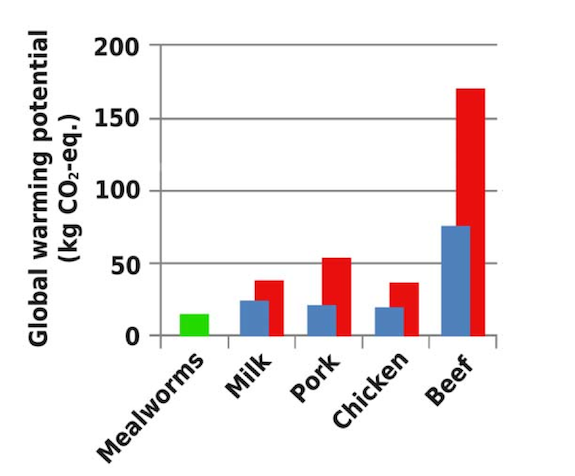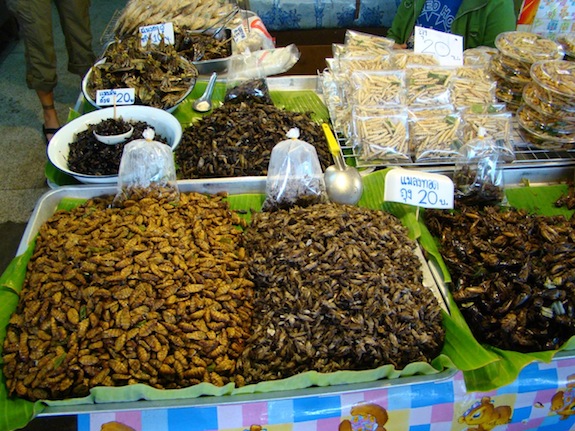The Sustainable Meat of the Future: Mealworms?
Mealworms might seem unpalatable to many, but a new study indicates that they might be the climate-friendly protein alternative of the future
![]()

It might seem disgusting, but a new study indicates that insects like mealworms might be the climate-friendly protein alternative of the future. Image via Wikimedia Commons/Pengo
The year is 2051. Given the realities of climate change and regulations on carbon emissions, beef and pork–protiens with high carbon footprints–have become too expensive for all but the most special of occasions. Luckily, scientists have developed an environmentally-friendly meat solution. Sitting down for dinner, you grab your fork and look down at a delicious plate of….mealworms.
That, anyway, is one possibility for sustainable meat examined by Dennis Oonincx and Imke de Boer, a pair of scientists from the University of Wageningen in the Netherlands, in a study published today in the online journal PLOS ONE.
In their analysis, cultivating beetle larvae (also known as mealworms) for food allowed the production of much more sustainable protein, using less land and less energy per unit of protein than conventional meats, such as pork or beef. In a 2010 study, they found that five different insect species were also much more climate-friendly than conventional meats—a pound of mealworm protein, in particular, had a greenhouse gas footprint 1% as large as a pound of beef.
“Since the population of our planet keeps growing, and the amount of land on this earth is limited, a more efficient, and more sustainable system of food production is needed,” Oonincx said in a statement. “Now, for the first time it has been shown that mealworms, and possibly other edible insects, can aid in achieving such a system.”
This prospect might seem absurd—and, for some, revolting—but the problem of greenhouse gas emissions resulting from meat production is quite serious. The UN estimates that livestock production accounts for roughly 18% of all emissions worldwide, caused by everything from the fuel burned to grow and truck animal feed to the methane emitted by ruminants such as cows as they digest grass. Of most concern, since world populations are increasing and growing more wealthy, is that the demand for animal protein is expected to grow by 70-80% by 2050.

Pound for pound, mealworm protein (green) produces much lower amounts of greenhouse gas emissions than both the high (red) and low (blue) estimates for conventional protein sources. Image via Oonincx
Insects like mealworms, the researchers suggest, can help to solve this problem. Since they aren’t warm-blooded (like mammals) they expend far less energy per pound as part of their metabolism, so they needn’t eat as much to survive. As a result, less energy goes into cultivating them as a food source, and less carbon dioxide gets emitted into the atmosphere.
The researchers came to this conclusion by conducting an environmental impact assessment for a commercial mealworm producer in the Netherlands (mealworms are often cultivated as a food for reptile and amphibian pets). They analyzed every input used in the process of rearing the worms, including the energy used to heat the incubators, the grain used as feed and the cardboard used for rearing cartons. Even including all these inputs, the worms were much more climate-friendly than conventional protein sources.

In Thailand and other Asian countries, insects have long been considered a viable food source. Image via Flickr user Chrissy Olson
Sure, you might be pretty reluctant to sit down to a bowl of mealworm macaroni, but in a number of places around the world—especially in Asia—they’re considered a perfectly normal food. Even some people here in the U.S. agree: A quick search reveals mealworm recipes you can cook up at home, like mealworm french fries and stir-fried mealworms with egg, while Mosto, a trendy restaurant in San Francisco, serves crispy mealworms over ice cream.
Better yet, mealworms are more healthy than conventional meats, too. According to PBS, a pound of mealworms has more protein and half as much fat as a pound of pork.
Still, there is one inescapable obstacle to widespread mealworm consumption: the “yuck” factor. For those of us who don’t typically eat insects, a forkful of mealworms triggers a profound feeling of disgust. Even this blogger—fully convinced of the wisdom of eating insects—can acknowledge from personal experience (an encounter with a bag of fried mealworms in Thailand) that knowing the worms are okay to eat and actually eating them are entirely separate matters.
/https://tf-cmsv2-smithsonianmag-media.s3.amazonaws.com/accounts/headshot/joseph-stromberg-240.jpg)
/https://tf-cmsv2-smithsonianmag-media.s3.amazonaws.com/accounts/headshot/joseph-stromberg-240.jpg)